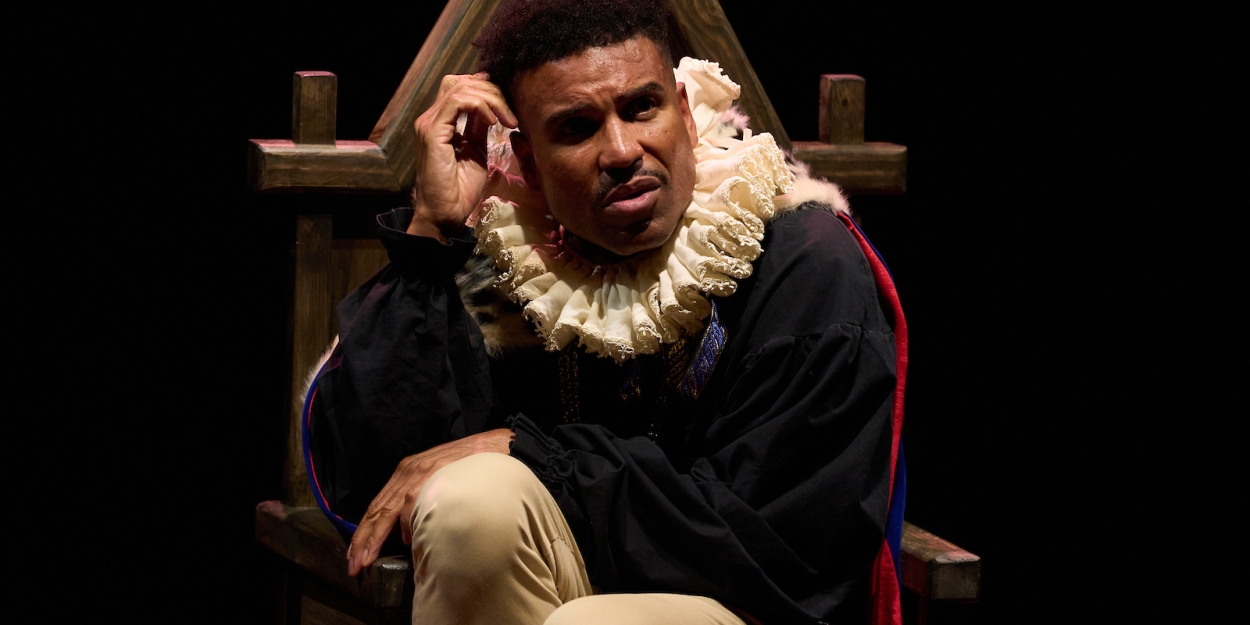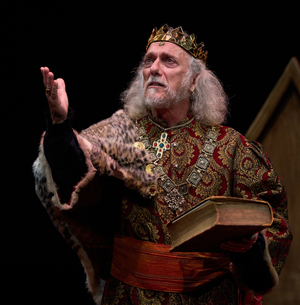Review: LIFE IS A DREAM at Upstream Theater
Upstream opens Calderón's "Life is a Dream"


Pedro Calderón de la Barca is often called “the Spanish Shakespeare”. His play, Life is a Dream, is enjoying a fine production by Upstream Theater. This play, from 1635, is one of the brightest gems of the Golden Age of Spanish Drama. This is the premiere performance of a fresh new translation by G. J. Racz. It’s a graceful translation, with just enough occasional rhyme to maintain the sense of verse.
The drama takes place in Poland. Years before, at the birth of Prince Segismund, his father, king Basil, had had the baby shut away in a remote dungeon because the king, through numerology, had foreseen that Segismund would be a merciless tyrant and would bring devastation to the kingdom. Now only the King and the prince’s keeper, Clotaldo, know of his existence.
There are only two known possible successors to King Basil: Princess Stella and Astolf, Duke of Muscovy. These two agree to marry and share the throne when Basil steps down.
And now a stranger, the lovely Rosaura, arrives in Poland accompanied by her comic side-kick, Clarion. She has come to avenge her honor. She must kill the nobleman who seduced and betrayed her. She is, of course (for travel purposes) disguised as a man. She and Clarion discover the hidden Crown Prince in his dungeon—and the drama begins.
The King, in a moment of banisher’s remorse, decides to give the imprisoned Crown Prince a chance; he’ll test whether Segismund can rule with wisdom and mercy. Segismund is drugged and brought to the palace. He awakes to find himself as king, surrounded by courtiers. Justifiably enraged that he has been imprisoned these many years he allows his anger—and his lust—to lash out. He was raised like a chained beast, and now he acts like a wild beast set free. When a courtier offends him Segismund casts him over a parapet to his death. When he is attracted to a lady-in-waiting (the newly-disguised Rosaura) Segismund attempts to ravish her.
So he flunks the kingship-test, and he’s drugged again and returned to his prison—being told that his kingship was all a dream.
But a rebel faction refuses to be ruled by a Muscovite, and they now know that there is a true Polish Crown Prince; so they free Segismund. Civil war begins. Surprise, surprise! After defeating the combined forces of his father and Astolf, Segismund displays immense magnanimity—a regeneration that makes Prince Hal’s reformation look like a minor New Year’s resolution. Segismund is now a noble king.
All is forgiven and Rosaura, after finding her father, recovers her honor by marrying Astolf, the bastard who betrayed her. (We all wanted her to marry Segismund, but despite appearances this isn’t really Poland, it’s really 17th century Spain—where court rules are court rules and where the sense of honor is heightened “almost to the fantastic”. So Segismund marries Princess Stella.)
In this translation of Life is a Dream Calderón’s four acts are reduced to two (and a half?). Well, there are one-and-a-half intermissions. All the principals survive the translation, though the author’s array of minor roles (“chamberlain, lords in waiting, officers, soldiers, etc.”) are reduced to two (busy) actors.
As usual with Upstream this is a strong cast. Philip Boehm consistently attracts our very best actors by offering them fine roles in remarkable plays (mostly at Equity rates). Diction is excellent throughout—an utter necessity in a classical verse play. In the intimate Marcelle theater not a syllable is lost.
Bryce A. Miller and Michael Pierce stalwartly fulfill the roles of all those “lords, soldiers, etc.” Mitchell Henry-Eagles and A. J. Baldwin play Astolf and Stella, the presuming heirs to the throne, with ardor and vehemence. Gary Glasgow gives Clotaldo a lovely gentleness—a nice contrast to the fierce emotions surrounding him. Clarion is the clown of the piece and is portrayed by one of St. Louis’ long-time favorite comic actors, Alan Knoll. Knoll gets the laughs and the irony, but his wit does not save him from a very bad end. Reginald Pierre fills prince Segismund with the great torment and anger so justified by his situation.
Two in the cast shine particularly brightly. Jennifer Theby-Quinn, as Rosaura, shows such grace and energy and utter commitment! (She did that astonishingly good one-woman play Iphegenia in Splott for Upstream two years ago.) She’s among the most gifted of her generation in St. Louis.
This production is Jerry Vogel’s tenth piece of work for Upstream. (I’ll never forget his masterful one-man show, An Iliad, in 2013.) Now, in classic verse dramas most modern actors have trouble “owning” their lines. Too often the lines seem to spring directly from the memory to the mouth without transiting the conscious mind. Too often actors are simply text-driven. Too often, once astride that trotting meter, an actor drops the reins and lets it carry him smoothly, thoughtlessly to the end of a speech. No breaking the meter; no tiny pauses to show the birth of a word, or to emphasize a word; no little hesitations or varyings of pace to show that the actor really means the words he’s saying. No ownership of the lines.
Well, to watch Jerry Vogel perform King Basil is to see a master-class in line ownership! This king is far more than a mere instrument for the music of the verse; Vogel makes every word absolutely natural, meaningful, and real! Bravo!! (I think part of his secret is a total surrender of self and a keen focus on the other folks on stage.)
Technical aspects of the show are very simple, and they are the work of some of St. Louis’ finest veteran professional talents: Patrick Huber designed the beautifully grim simple set; costumes by Michele Friedman Siler, lighting by Steve Carmichael, and sound by Philip Boehm and Sabria Bender all rise to the admirably professional level we’ve come to expect at Upstream.
Upstream Theater’s production of Calderón’s Life is a Dream continues at the Marcelle through November 3.
Reader Reviews

Videos

